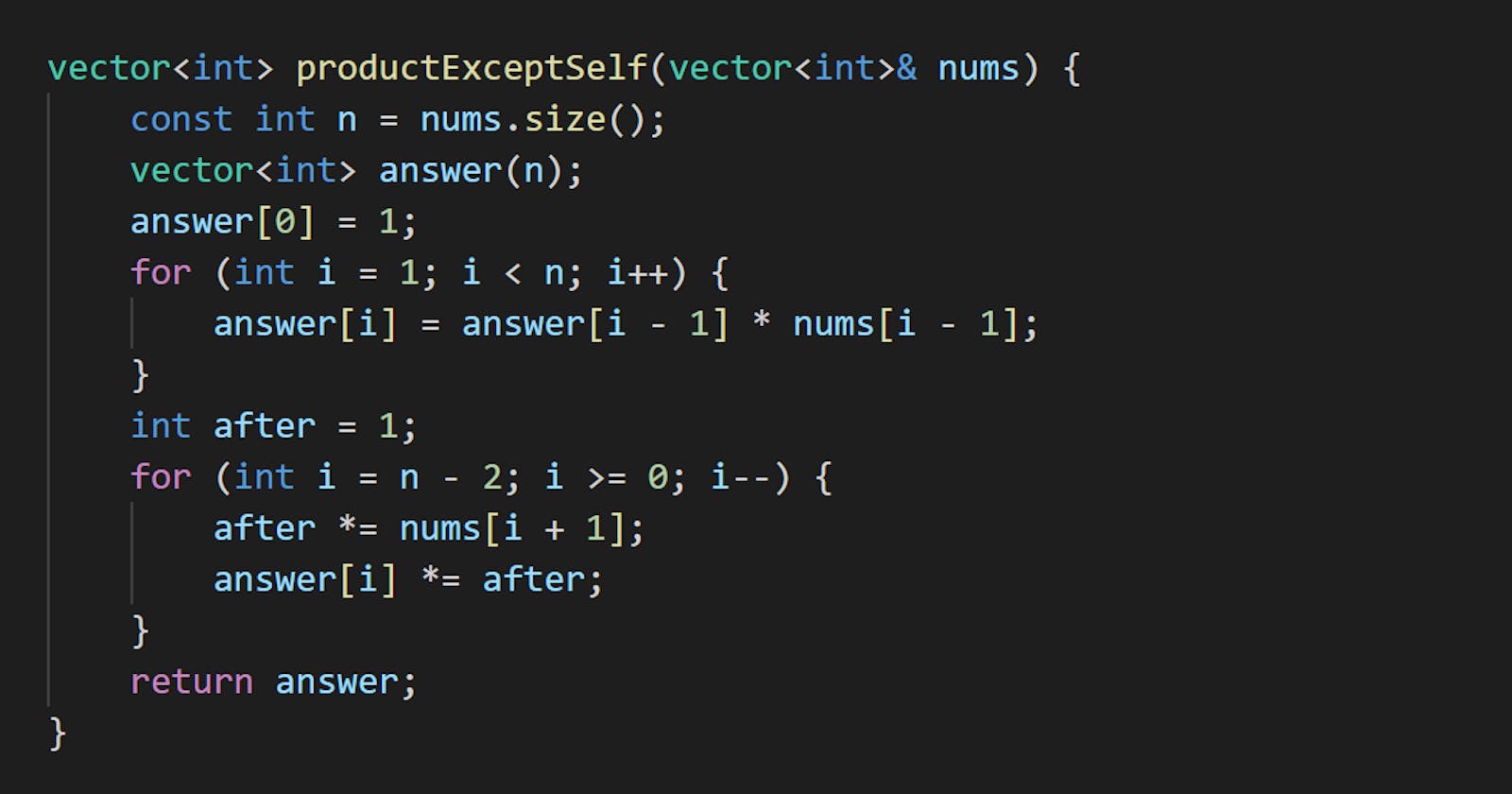C++ Solution to Coding Challenge 238. Product of Array Except Self
An example of the prefix sum technique
Problem statement
Given an integer array nums, return an array answer such that answer[i] is equal to the product of all the elements of nums except nums[i].
The product of any prefix or suffix of nums is guaranteed to fit in a 32-bit integer.
You must write an algorithm that runs in O(n) time and without using the division operation.
Example 1
Input: nums = [1,2,3,4]
Output: [24,12,8,6]
Example 2
Input: nums = [-1,1,0,-3,3]
Output: [0,0,9,0,0]
Constraints
2 <= nums.length <= 10^5.-30 <= nums[i] <= 30.The product of any prefix or suffix of
numsis guaranteed to fit in a 32-bit integer.
Follow up: Can you solve the problem in O(1) extra space complexity? (The output array does not count as extra space for space complexity analysis.)
Solution 1: Compute the prefix and suffix products
To avoid division operation, you can compute the prefix product and the suffix one of nums[i].
Code
#include <vector>
#include <iostream>
using namespace std;
vector<int> productExceptSelf(vector<int>& nums) {
const int n = nums.size();
vector<int> prefix(n);
prefix[0] = 1;
for (int i = 1; i < n; i++) {
prefix[i] = prefix[i - 1] * nums[i - 1];
}
vector<int> suffix(n);
suffix[n - 1] = 1;
for (int i = n - 2; i >= 0; i--) {
suffix[i] = suffix[i + 1] * nums[i + 1];
}
vector<int> answer(n);
for (int i = 0; i < n; i++) {
answer[i] = prefix[i] * suffix[i];
}
return answer;
}
void print(vector<int>& nums) {
for (auto& v : nums) {
cout << v << " ";
}
cout << endl;
}
int main() {
vector<int> nums = {1, 2, 3, 4};
auto answer = productExceptSelf(nums);
print(answer);
nums = {-1, 1, 0, -3, 3};
answer = productExceptSelf(nums);
print(answer);
}
Output:
24 12 8 6
0 0 9 0 0
Complexity
Runtime:
O(n), wheren = nums.length.Extra space:
O(2n).
Solution 2: Use directly vector answer to store the prefix product
In the solution above you can use directly vector answer for prefix and merge the last two loops into one.
Code
#include <vector>
#include <iostream>
using namespace std;
vector<int> productExceptSelf(vector<int>& nums) {
const int n = nums.size();
vector<int> answer(n);
answer[0] = 1;
for (int i = 1; i < n; i++) {
answer[i] = answer[i - 1] * nums[i - 1];
}
int suffix = 1;
for (int i = n - 2; i >= 0; i--) {
suffix *= nums[i + 1];
answer[i] *= suffix;
}
return answer;
}
void print(vector<int>& nums) {
for (auto& v : nums) {
cout << v << " ";
}
cout << endl;
}
int main() {
vector<int> nums = {1, 2, 3, 4};
auto answer = productExceptSelf(nums);
print(answer);
nums = {-1, 1, 0, -3, 3};
answer = productExceptSelf(nums);
print(answer);
}
Output:
24 12 8 6
0 0 9 0 0
Complexity
Runtime:
O(n), wheren = nums.length.Extra space:
O(1).
